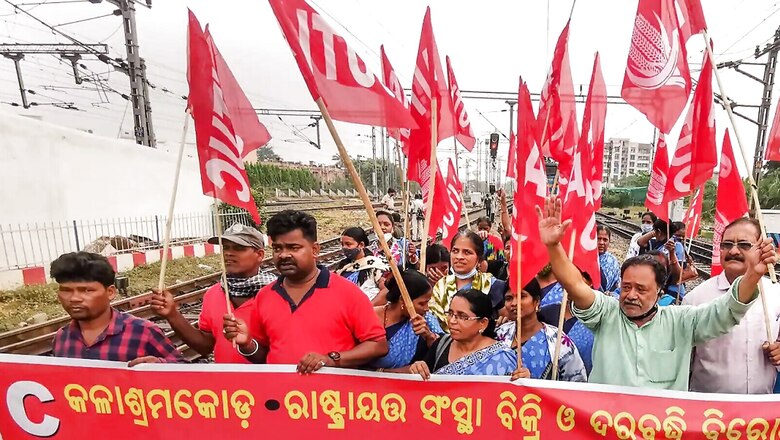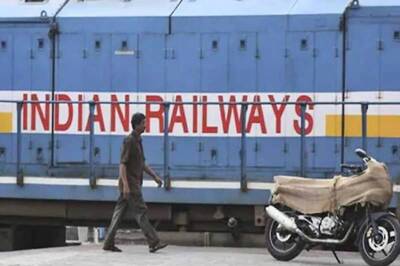
views
The all-India strike on March 28 and 29, called by a bunch of trade unions, is extremely unfortunate. The cause mentioned by the unionists — the Narendra Modi government’s policies which are “affecting workers, farmers, and people” — is as phony as their concern for workers, farmers, and people.
“The strike is set to negatively impact banking and transport services across the country starting Monday,” News18 report said. “The Joint Platform of Central Trade Unions had held a meeting in Delhi on March 22 to take stock of the preparations in various states and sectors for the strike, a statement had said. Strike notices have been sent to various unions to join the strike,” the report added.
Only the unionists can tell us how a strike helps workers, farmers, and people. Ordinary people, unlike the opulent, earn money when they work in factories, fields, offices, etc.; and they suffer when there is no work; they, especially those in the unorganised sector, suffered a lot because of the COVID-induced lockdowns.
At a time when the pandemic is receding and the economy is slowly picking up (though there are concerns about a K-shaped recovery signifying greater inequalities), imposing a shutdown is highly irresponsible and self-defeating.
This raises the question: whose interests the trade unions represent in the first place? The answer is not very comforting: politicians.
Trade union leaders talk about workers, farmers, and people. The entire talk is carried out in a jaded Leftist phraseology and is informed by long-discredited Marxist ideas: rant against capitalists; resistance to privatisation, liberalisation, and globalisation; opposition to foreign direct investment; constant reminders of the resurrection of East India Company; unending tirade against multinational corporations, and so on.
But how many ordinary people are bothered about ‘neo-imperialism’ and the supposed menace of ‘neo-liberalism’? They welcome MNCs; they like to work with MNCs and would like the same for their children too.
My elder brother, a graduate, worked with a small private company where the employer’s entire focus was on paying as little as possible and keeping him in office as long as possible. After some time, he was hired by a German global major; there was a huge jump in salary, but even more attractive were the work conditions, with five-day week and corporate atmosphere. He worked there for over three decades; years after retirement, he still fondly remembers his association with the MNC. He wanted his son to work for an MNC; that also happened.
This is not an isolated story; all common people like to be associated with MNCs, for they pay higher and offer better working conditions. And all trade unionists see an East India Company in every MNC.
At any rate, common people are rarely interested in the intricacies of economic policy. However, trade unionists of all hues — from the ones run by ‘commies’ to those under saffron apparatchiks — want exactly opposite of that. They want India to enter the time machine and walk back to the dark ages of pre-1991 socialism in which the licence-permit-quota raj stifled entrepreneurship, politicians and bureaucrats fattened their purses at the expense of wealth creators, and anti-business unionists had a gala time.
This brings us to the larger question of representativeness. Not just unionists but other segments of civil society too are not very representative. Political parties have annexed them. Just like trade unions, farmers’ bodies have also been taken over by the front organisations of parties. For instance, the RSS-affiliated Bharatiya Kisan Sangh were nowhere in the stir against the farm laws, which the government eventually repealed.
The appropriateness of the repealed laws is not the issue here. I believe they were excellent pieces of legislation which would have hugely helped the farmer and the economy, but the BKS didn’t support the laws for this reason; it supported them because they were introduced by their own government.
Similarly, students’ and teachers’ associations, women’s bodies, and other civil society organisations have slipped into the clutches of major political parties. Unsurprisingly, such organisations are more inclined to promote the interests of their party bosses rather than those sections of society they claim to represent.
Trade unions, for instance, should be more focused on employees’ salaries, the quantum of increments, working conditions, healthcare facilities, social security, and the like. But union leaders seem more interested in fighting against the sale of public sector undertakings, FDI in the Railways, defence, insurance sectors, etc.
This is the reason that trade unions are becoming irrelevant. If they intend to have any role in the liberalised economy, they must become part of the solution, not the problem. They should certainly give up the pre-reforms methods like strikes.
The author is a freelance journalist. The views expressed in this article are those of the author and do not represent the stand of this publication.
Read all the Latest Opinion News and Breaking News here
















Comments
0 comment